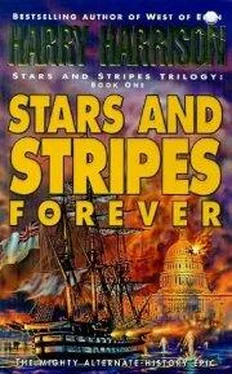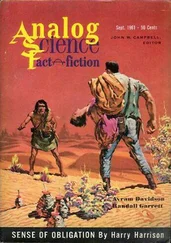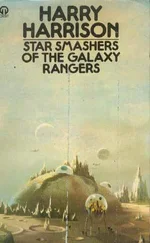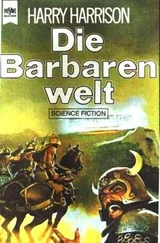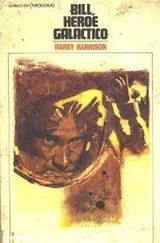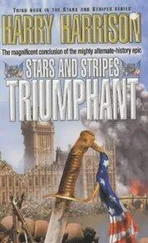Harry Harrison - Stars and Stripes Forever
Здесь есть возможность читать онлайн «Harry Harrison - Stars and Stripes Forever» весь текст электронной книги совершенно бесплатно (целиком полную версию без сокращений). В некоторых случаях можно слушать аудио, скачать через торрент в формате fb2 и присутствует краткое содержание. Год выпуска: 1998, ISBN: 1998, Издательство: Hodder & Stoughton, Жанр: Альтернативная история, на английском языке. Описание произведения, (предисловие) а так же отзывы посетителей доступны на портале библиотеки ЛибКат.
- Название:Stars and Stripes Forever
- Автор:
- Издательство:Hodder & Stoughton
- Жанр:
- Год:1998
- ISBN:0-340-68917-X
- Рейтинг книги:3 / 5. Голосов: 1
-
Избранное:Добавить в избранное
- Отзывы:
-
Ваша оценка:
- 60
- 1
- 2
- 3
- 4
- 5
Stars and Stripes Forever: краткое содержание, описание и аннотация
Предлагаем к чтению аннотацию, описание, краткое содержание или предисловие (зависит от того, что написал сам автор книги «Stars and Stripes Forever»). Если вы не нашли необходимую информацию о книге — напишите в комментариях, мы постараемся отыскать её.
imagines what history might have been like if Great Britain had attacked America at the height of the Civil War.
Stars and Stripes Forever — читать онлайн бесплатно полную книгу (весь текст) целиком
Ниже представлен текст книги, разбитый по страницам. Система сохранения места последней прочитанной страницы, позволяет с удобством читать онлайн бесплатно книгу «Stars and Stripes Forever», без необходимости каждый раз заново искать на чём Вы остановились. Поставьте закладку, и сможете в любой момент перейти на страницу, на которой закончили чтение.
Интервал:
Закладка:
Stars and Stripes Forever
by Harry Harrison
For Nat Sobel — with immense thanks
There is no privileged past… There is an infinitude of Pasts, all equally valid… At each and every instant of Time, however brief you suppose it, the line of events forks like the stem of a tree putting forth twin branches.
—André MauroisA LOOK AT WHAT MIGHT HAVE BEEN
There, in the center of London, his statue sits in Imperial Roman splendor, toga-garbed and carved in finest marble. Prince Albert, consort to Queen Victoria, his memory enshrined in what is probably the ugliest monument in the world; the Albert Memorial.
He was a kind man and much loved by the Queen; he brought her true happiness. But did this Saxon prince, who never lost his thick German accent, ever do anything of any importance? Other than father the future king.
He certainly did. He averted war with the United States.
In 1861 the American Civil War was still in its first murderous year. Britain and France, to the dismay of the North, were planning to recognize the South as a separate nation. Now the British steam packet Trent was taking the two newly appointed Confederate commissioners, James M. Mason and John Slidell, to England to represent President Jefferson Davis.
On the eighth of November 1861 the Trent was stopped at sea by the USS San Jacinto. When her commanding officer, Captain Wilkes, found that there were two rebels aboard the Trent he had them arrested on the spot and removed from the British ship.
England was aroused, furious. The War of 1812, when Britain had been at war with the newly established United States of America, was still fresh in memory. With the Northern blockade of the Confederate ports biting deep, there was little cotton from the South and the weaving mills of the North were facing bankruptcy. The Prime Minister, Lord Palmerston, saw the boarding of a British ship and the seizing of the passengers as a deliberate insult to Britain’s sovereignty. The Foreign Minister, Lord John Russell, echoed the public sentiment when he sent a dispatch to President Lincoln ordering him to release the men immediately — or suffer the consequences. British troops and thousands of rifles were dispatched to Canada and troops massed on the United States border.
Enter the peaceful Prince Albert. Already terminally ill with lung congestion — which was in reality typhoid fever caught from the foul water supply and drains of Windsor Castle — he did a rewrite of the dispatch, ameliorating the language and giving Lincoln a face-saving way out. Queen Victoria approved of the changes and it was sent to Washington.
On December 26 President Lincoln ordered that the two Confederate commissioners be released.
Sadly, Prince Albert would never know that he had averted what very well could have been a tragic confrontation. He had died on the fourteenth of the same month.
But consider for a moment what would have happened if he had not changed the fatal dispatch.
What if Lincoln had been forced by the strong language to ignore the ultimatum?
What if the British invasion of the United States had gone forward?
What if there had been war?
NOVEMBER 8, 1861
The USS San Jacinto rocked gently in the calm seas of the South Atlantic; blue water below, blue sky above. The fire in her boiler was banked and only a trickle of smoke rose up from her high funnel. The Bahama Channel was only fifteen miles wide at this point, near the Parador del Grande lighthouse, a bottleneck through which all the island traffic funneled. Captain Charles D. Wilkes stood on the bridge of the American warship, hands clasped behind his back, staring grimly toward the west.
“Smoke in sight,” the lookout stationed in the crow’s nest called out. “East southeast.”
The captain did not move as Lieutenant Fairfax repeated the sighting. The ship that he was waiting for would be coming from the west — should be coming soon if his calculations were correct. If the reports from the Union spies in Cuba could be believed, the men he was seeking should be on board. The chase so far had been a frustrating one; all about the Caribbean. The wanted men had been one step ahead of him ever since he had sailed from Florida. This would be his last chance to apprehend them. If he were wrong, and the Trent did not take this passage between the islands, she would now be safely on her way back to England and the pair would have escaped.
The decision he had made to station his ship here in the Old Bahama Channel was based completely on speculation. If the two men had indeed boarded the Trent, and if the steam packet had left Havana as scheduled — and if she took this course to St. Thomas, why then she should be here by noon at the latest. He started to reach for his watch, then stopped, not wanting to reveal eagerness or doubt before the crew. Instead he squinted up at the sun; surely it was close to the meridian. He clasped his hands even tighter behind his back and the scowl deepened on his face.
Five minutes went by — they could have been five hours — before the lookout called out again.
“Steamer ahoy! Just off the port bow.”
“Raise steam,” the captain ordered. He slammed his fist on the rail. “That’s the Trent, I know that is the Trent. Have the drums beat to quarters.”
Lieutenant Fairfax repeated the commands. In the engine room the boiler doors clanged open and the stokers hurled shovel load after shovel load of coal onto the fire. The deck thudded with the sound of running feet. Fairfax relaxed a little when he saw the slightest of smiles on the captain’s lips. Wilkes was a hard man to serve under at any time, gruff and bad-tempered at being passed over so often for command. Sixty-two years old and seemingly doomed to remain forever behind his desk as chairman of the Lighthouse Board. Only the outbreak of war had saved him from that. Dispatched to Fernando Po to bring back this veteran wooden steamer to the Philadelphia Naval Yard, he had violated his orders as soon as they had reached Florida and heard about the search that was going on. He never for an instant considered going to the navy yard, not while two traitors were still at large! He needed no orders to apprehend them — just as he had needed no orders from his superiors in the long-gone days when he explored and mapped the frozen Antarctic wilderness. He had little faith in the official chain of command and was always happier working alone.
The deck vibrated as the screw turned and a small wave foamed at the bow. Fairfax had his glass pointed at the approaching ship, hesitated to speak until he was absolutely sure.
“That is the Trent, sir, I know her lines well. And it is just as you said, eleven-forty, just before noon.” There was more than a little awe in his voice; Wilkes nodded.
“Our English cousins are good at punctuality, Lieutenant. They are not good at much else.” He had been a fourteen-year-old midshipman when the British Shannon had half destroyed the first ship he ever sailed in, the Chesapeake. Captain Lawrence, mortally wounded by musket fire, had died in his arms. He had never forgotten the dying man’s last words — “Don’t give up the ship.” Yet despite the captain’s order the colors had been struck and the ship had surrendered so that he, and the surviving crew members, ended up in a filthy British jail. He had never lost his hatred of the British since then.
“Hoist the flag,” he ordered. “As soon as they can see it signal her to stop engines and prepare for boarding.”
The helmsman brought the ship about in a smooth turn until they were sailing on a parallel course close to the steam packet.
Читать дальшеИнтервал:
Закладка:
Похожие книги на «Stars and Stripes Forever»
Представляем Вашему вниманию похожие книги на «Stars and Stripes Forever» списком для выбора. Мы отобрали схожую по названию и смыслу литературу в надежде предоставить читателям больше вариантов отыскать новые, интересные, ещё непрочитанные произведения.
Обсуждение, отзывы о книге «Stars and Stripes Forever» и просто собственные мнения читателей. Оставьте ваши комментарии, напишите, что Вы думаете о произведении, его смысле или главных героях. Укажите что конкретно понравилось, а что нет, и почему Вы так считаете.
